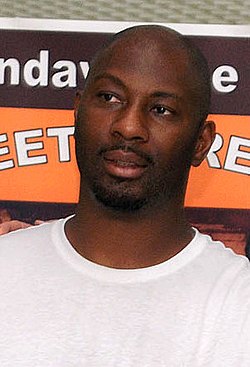Elden Campbell

Campbell in 2008
|
|
| Personal information | |
|---|---|
| Born |
July 23, 1968 Los Angeles, California |
| Nationality | American |
| Listed height | 6 ft 11 in (2.11 m) |
| Listed weight | 279 lb (127 kg) |
| Career information | |
| High school | Morningside (Inglewood, California) |
| College | Clemson (1986–1990) |
| NBA draft | 1990 / Round: 1 / Pick: 27th overall |
| Selected by the Los Angeles Lakers | |
| Playing career | 1990–2005 |
| Position | Power forward / Center |
| Number | 41, 5 |
| Career history | |
| 1990–1999 | Los Angeles Lakers |
| 1999–2002 | Charlotte Hornets |
| 2002–2003 | New Orleans Hornets |
| 2003 | Seattle SuperSonics |
| 2003–2005 | Detroit Pistons |
| 2005 | New Jersey Nets |
| 2005 | Detroit Pistons |
| Career highlights and awards | |
|
|
| Career NBA statistics | |
| Points | 10,805 (10.3 ppg) |
| Rebounds | 6,116 (5.9 rpg) |
| Blocks | 1,602 (1.5 bpg) |
| Stats at Basketball-Reference.com | |
Elden Jerome Campbell (born July 23, 1968) is a retired American professional basketball player who played as a power forward and center in the National Basketball Association (NBA).
Campbell attended Morningside High School in Inglewood, California before playing college basketball at Clemson University. During his four years at Clemson, he averaged 15.3 points per game, 6.8 rebounds per game and 2.7 blocks. His college team was involved in one of the most notable plays in college basketball history – a one-point loss in the 1990 NCAA Tournament to a Connecticut team following a miraculous full-court catch-and-shoot play by Tate George with one second on the clock. That same year, the Los Angeles Lakers drafted Campbell with the 27th pick in the 1990 NBA draft.
On March 10, 1999, Campbell was traded by the Lakers along with Eddie Jones to the Charlotte Hornets for Glen Rice, J. R. Reid and B. J. Armstrong.
Campbell's longest tenures were with the Lakers and the Hornets (in both Charlotte and New Orleans); he would also play with the Seattle SuperSonics and briefly for the New Jersey Nets, spending most of the final two seasons of his career as a member of the Detroit Pistons, being on roster in the 2004 NBA Championship team. During Campbell's tenure with the Pistons, perhaps his most important contribution was his defense against center Shaquille O'Neal in the two playoff series in which the Pistons engaged O'Neal's teams (against the Lakers in the 2004 Finals and against the Miami Heat in the 2005 NBA Eastern Conference Finals); because of his enormous bulk and strength, he presented a unique challenge to O'Neal in the low post and was one of the few NBA players who could pose a serious physical challenge to O'Neal on defense.
...
Wikipedia
